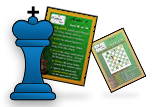16 Habits of Mind
Engaging children in the 16 habits of mind through chess
- Persisting - keep looking for the answer even if it takes a little bit longer.
- Managing Impulsivity - not to make the first move that comes to mind. Look for better moves
- Listening to others - with Understanding and Empathy - listen to what the other kids have to say about their moves.
- Striving for Accuracy and Precision - calculate more than one move ahead and visualize.
- Questioning and Posing Problems - not be afraid to ask questions and suggesting alternative moves.
- Applying Past Knowledge to New Situations - pattern recognition of chess positions.
- Thinking and Communicating with Clarity and Precision - why certain moves are not as good as others.
- Creating, Imagining and Innovating - lots of opportunities of these in chess especially visualization.
- Responding with Wonderment and Awe - show them brilliant moves played by great chess players
- Taking Responsible Risks - making moves which may not be 100% correct but offers reasonable chances.
- Finding Humor - telling them funny incidences which happened in chess events and tournaments
- Thinking Interdependently - do not follow blindly what others propose.
- Learning Continuously - self-explanatory.
- Gathering Data through All Senses - feeling the pieces, looking at the body language of the opponent, realizing how fast/slow the opponent is making their moves, sensing the uneasiness of the opponent when confronted with an unexpected move.
- Thinking Flexibly - ability to change plan of action when confronted with different replies from the opponent.
- Thinking about our Thinking (meta-cognition) - cultivate the habit of re-evaluating the way we strategise in chess.


